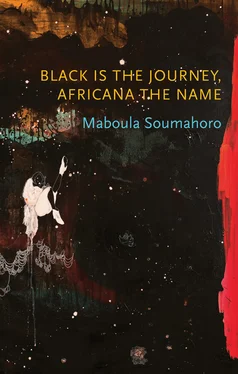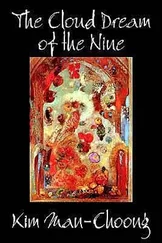This autobiography of reading is also an account of linguistic estrangement. The question of a mother tongue is as pressing for Soumahoro as any other Black writer in the diaspora, and she is as intent on finding an idiom, a tongue that might liberate her from the colonial script, from alienation and estrangement, from being a foreigner in her natal land. Unlike her parents, Soumahoro doesn’t speak Jula or any other African language. Her first language is French, yet the language in which is she is most proficient feels foreign on the tongue. It is the constant reminder of her displacement in diaspora; it is the linguistic register of her dispossession and anguish. 12
Perhaps the great surprise of the text is that English proves to be the language that makes it possible for Soumahoro to write blackness into being and to feel comfortable inside her skin. From the space of exile, or in the movement of the detour, Soumahoro writes diaspora by reimagining Africa, not as a given or as an origin, but as a territory of loss and longing for Black Europeans separated by only one generation from the continent. Imagination creates the shared sentiment of diaspora and remains its common language, not a mother tongue or its comforts. This observation is made plain in an itinerary of reading that includes writers from across the diaspora, all of whom are struggling to find an idiom to write Black becoming, Black existence across time.
How does one write as a “dominated person in a dominant country”? How does one create dangerously in an imposed language, in a mother tongue that is alien? How does one write in a state of dispossession? Does the “burden of race” differ, or is it intensified, when the instrumental language of universalism thwarts any and every attempt to speak to racism and antiblackness? Can the matter of blackness ever become indigenous to French soil, ever part of the national accounting? Is the status of the Black as perpetual foreigner and eternal alien ever to be eradicated?
After a decade of residing in New York City, Soumahoro returns to France. The journey back is difficult, yet she is able to find home in the soundscape of the Black city-within-the-city, in rap music and the contemporary hip-hop scene, perhaps the only space in the public sphere willing to engage the ugly history of the republic and avow the racialized order. It is the sole discourse available for representing the lives of those residing in the banlieue and at the margins of the nation. Only hip-hop artists seem capable of “conjur[ing] up the existence or the presence of Black French people within the space of the Hexagon” and without a detour through Africa or the Americas being required. Elsewhere, the fact of one’s Frenchness is challenged and contested on every front. Black French are represented as outsiders to France. “No rootedness in Europe seems to be imaginable” (p. 81).
State violence and police brutality hone this sense of blackness and chosen affiliation; this enhanced vulnerability to violence and premature death is a condition distributed across the Atlantic. In 2005, the riots in the banlieues of Paris and other French cities and escalating police violence prompt Soumahoro to write her first article about France. “It became no longer possible for me to hide behind Black Americans to understand the functioning and consequences of racial categorization. It had become necessary for me to confront – to face up to – my own experience in my native land. Turning a blind eye had become impossible” (p. 69). It was the year the “race question” became a matter of public debate.
The burden of always having to explain the Black French presence by way of analogy or through the detour of the US or the Caribbean or Africa is no longer productive and quite damaging to the discussion of racism in France. The “exhausting task of explaining, translating and rendering intelligible situations that are violent, discriminatory or racist” is a task identified by Soumahoro as “the last detour” (p. 83). It goes without saying that the effort to explain has changed little despite the centuries of explanation and demonstration. “What is there left to understand? What remains so difficult to grasp?” (p. 83). Why the need to restate and explain the obvious: racism exists and it determines social, political, and economic relations. The violence of racism is “magnified tenfold by the denial of the very existence of racism.” As Soumahoro writes:
We are dealing with a powerful form of denial or with disavowal. If it is simply a matter of denial, one wonders what kind of pathological irresponsibility has prevented a coming to consciousness … we are talking about a conscious rejection of reality. The essential question is, then, to know what is hidden behind the relentless and determined denial and rejection of the reality of race. What, that is, is the point of refusing race? This relentless denial and rejection of reality is what exposes the very stakes of that reality (p. 84).
Black is the Journey, Africana the Name is necessary reading, now more than ever, as has been made clear by the protests against racism and state violence by millions across the globe. It is a powerful and eloquent book that expands our understanding of racism and writes trenchantly about blackness in a global frame.
1 1 Dionne Brand, An Autobiography of the Autobiography of Reading (Alberta: University of Alberta Press, 2020): 8.
2 2 VeVe Clark, “Developing Diaspora Literacy and Marassa Consciousness,” in Hortense Spillers, ed. Comparative American Identities (New York: Routledge, 1991): 40–61.
3 3 Katherine McKittrick and Clyde Woods, Black Geographies and the Politics of Place (Boston, MA: South End Press, 2007).
4 4 Audre Lorde, “The Master’s Tools Will Never Dismantle the Master’s House,” in Sister Outsider: Essays and Speeches (Berkeley, CA: Crossing Press, 1984).
5 5 Brent Edwards, The Practice of Diaspora: Literature, Translation and the Rise of Black Internationalism (Cambridge, MA: Harvard University Press, 2003): 13–15, 20.
6 6 Christina Sharpe, In the Wake: On Blackness and Being (Durham, NC: Duke University Press, 2016).
7 7 Edouard Glissant, Caribbean Discourse, tr. Michael Dash (Charlottesville, VA: University of Virginia Press, 1981).
8 8 Edwards, The Practice of Diaspora: 23, 24.
9 9 Glissant, Caribbean Discourse: 20. Translation modified by Brent Edwards.
10 10 Tina Campt, Listening to Images (Durham, NC: Duke University Press, 2017).
11 11 Alexander Weheliye, Habeas Viscus: Racializing Assemblages, Biopolitics and Black Feminist Theories of the Human (Durham, NC: Duke University Press, 2014).
12 12 NourbeSe Philip, “Discourse on the Logic of Language,” in She Tries Her Tongue, Her Silence Softly Breaks (Middletown, CT: Wesleyan University Press, 2015).
Конец ознакомительного фрагмента.
Текст предоставлен ООО «ЛитРес».
Прочитайте эту книгу целиком, купив полную легальную версию на ЛитРес.
Безопасно оплатить книгу можно банковской картой Visa, MasterCard, Maestro, со счета мобильного телефона, с платежного терминала, в салоне МТС или Связной, через PayPal, WebMoney, Яндекс.Деньги, QIWI Кошелек, бонусными картами или другим удобным Вам способом.












